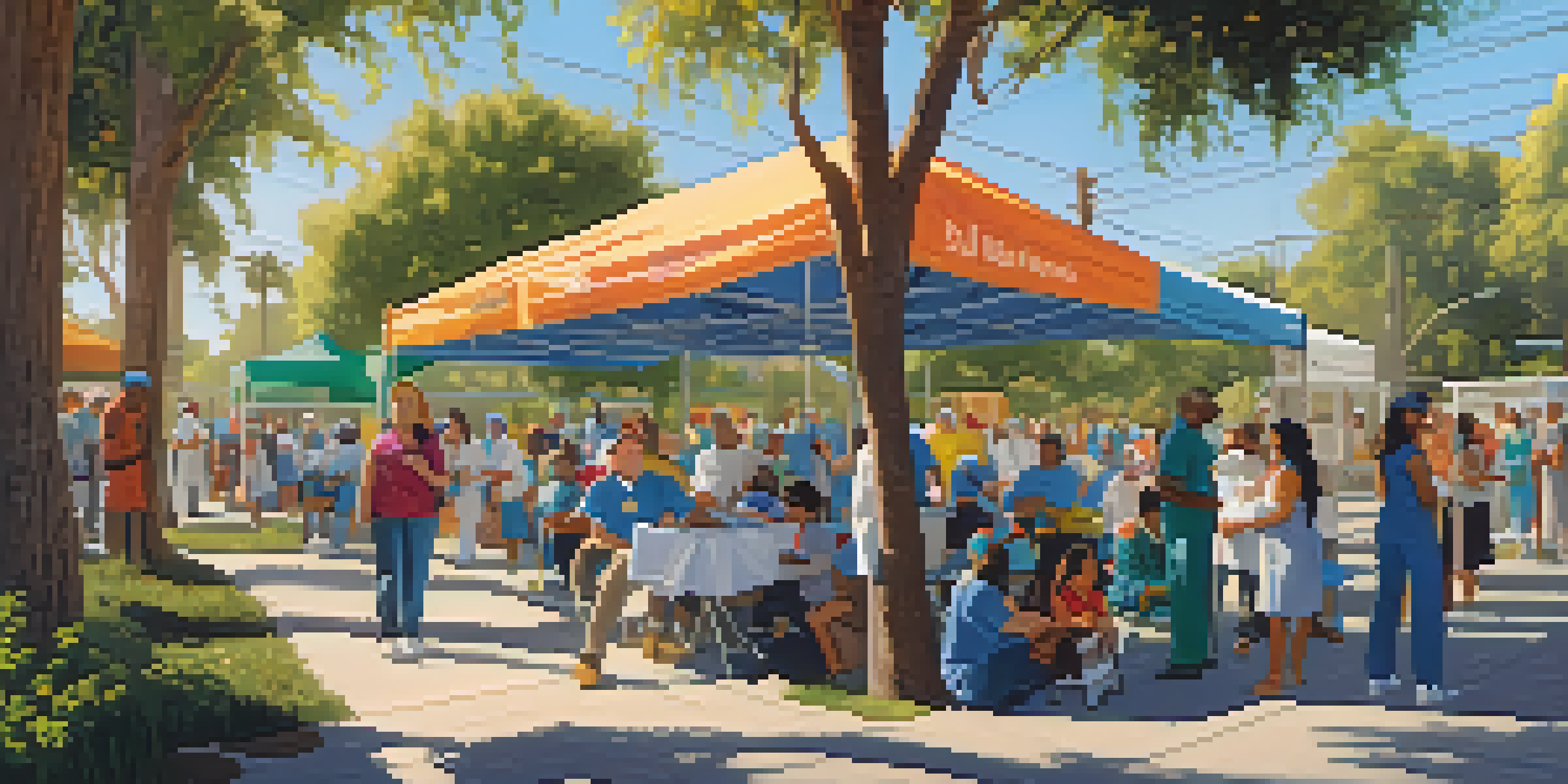The Importance of Vaccination in LA Public Health Efforts

Understanding Vaccination and Its Public Health Goals
Vaccination is a vital public health tool designed to prevent the spread of infectious diseases. By introducing a small, harmless piece of the pathogen into the body, vaccines stimulate the immune system to build defenses. This means that when the real pathogen strikes, the body is ready to fight it off. In Los Angeles, vaccination efforts are crucial for protecting the community, especially in densely populated areas where diseases can spread rapidly.
Vaccines are the cornerstone of public health. They protect individuals and communities and are one of the most effective ways to prevent disease.
The primary goal of vaccination is to achieve herd immunity, which occurs when a significant portion of the population becomes immune to a disease. This protects those who cannot be vaccinated, such as infants or individuals with certain health conditions. In LA, where diversity and population density are high, herd immunity is essential to prevent outbreaks. When the majority of people are vaccinated, the likelihood of disease transmission decreases dramatically, safeguarding vulnerable populations.
Moreover, vaccination can lead to the eradication of diseases. For example, smallpox was completely eliminated worldwide thanks to a robust global vaccination campaign. In Los Angeles, ongoing vaccination programs aim to control diseases like measles and whooping cough, which can have serious health consequences. By prioritizing vaccination, LA is not only protecting its residents but also contributing to global health efforts.
The Impact of Vaccination on Community Health in LA
Vaccination significantly impacts community health by reducing the incidence of preventable diseases. In LA, this has been evident with the decline of diseases like polio, rubella, and chickenpox, thanks to widespread vaccination efforts. Health departments work diligently to ensure that vaccines are accessible to all, from children to adults. This collective health improvement enhances the quality of life for everyone in the city.

Additionally, vaccinations help alleviate the burden on healthcare systems. When fewer people contract preventable diseases, hospitals and clinics can focus their resources on treating other health issues. This is particularly important in LA, where healthcare resources can be stretched thin due to the sheer number of residents. By keeping vaccination rates high, public health officials can better manage healthcare resources and provide necessary care to those in need.
Vaccination Ensures Community Safety
Vaccination helps build herd immunity, protecting vulnerable populations in densely populated areas like Los Angeles.
Furthermore, vaccinations play a crucial role in economic stability. Outbreaks of infectious diseases can lead to significant economic losses, including increased healthcare costs and decreased productivity. By investing in vaccination programs, LA can prevent these outbreaks, ensuring a healthier workforce and a more robust economy. In essence, vaccination is not just a health issue; it’s also an economic imperative for the city.
Addressing Vaccine Hesitancy in Los Angeles
Despite the proven benefits of vaccination, vaccine hesitancy remains a significant challenge in Los Angeles. Misinformation and fear about vaccine safety can lead some residents to delay or forgo vaccinations altogether. Public health officials are working hard to counter these misconceptions by providing accurate information and resources to the community. Engaging conversations about the importance of vaccines can help alleviate fears and encourage informed decision-making.
The only way to end this pandemic is to vaccinate as many people as possible, as quickly as possible.
Community outreach programs play a vital role in addressing vaccine hesitancy. By partnering with local organizations and trusted community leaders, health departments can reach those who may be skeptical about vaccines. These programs often include educational workshops, Q&A sessions, and social media campaigns that share personal stories from vaccinated individuals. By fostering a sense of trust and transparency, LA can help more residents understand the importance of vaccinations.
Additionally, addressing logistical barriers is crucial in encouraging vaccination. Many people may want to get vaccinated but face challenges such as lack of transportation or financial constraints. By offering free or low-cost vaccination clinics in easily accessible locations, LA can ensure that vaccinations are within reach for everyone. This comprehensive approach not only tackles hesitancy but also promotes equity in healthcare access.
The Role of Schools in Promoting Vaccination
Schools play a pivotal role in promoting vaccination among children and their families. In Los Angeles, educational institutions often serve as vaccination hubs, providing easy access to immunizations for students. This not only protects the children but also helps maintain a healthy school environment, reducing the risk of outbreaks. By integrating vaccination programs within schools, LA is taking proactive steps towards public health.
Moreover, schools can help educate parents about the importance of vaccinations. Many parents may not be fully aware of the vaccination schedule or the potential risks of not vaccinating their children. By hosting informational sessions and distributing educational materials, schools can empower parents to make informed choices. This collaborative effort between schools and public health officials is essential in fostering a culture of health and wellness.
Addressing Vaccine Hesitancy
Community outreach and education are essential to combat misinformation and encourage informed vaccination decisions.
Additionally, schools can implement policies that require vaccinations for enrollment. While this may seem strict, it has proven effective in increasing vaccination rates. By ensuring that all children are vaccinated before attending school, LA can create a safer environment for learning. This policy not only protects individual students but also contributes to the overall health of the community.
Vaccination and Public Health Equity in Los Angeles
Public health equity is a significant concern in Los Angeles, where disparities in healthcare access can affect vaccination rates. Low-income communities and marginalized populations often face barriers that prevent them from receiving vaccinations. Recognizing this, LA's public health initiatives are focused on ensuring that all residents, regardless of their background, have equal access to vaccines. This commitment to equity is crucial for building a healthier city.
Efforts to improve vaccination access include mobile clinics and outreach programs specifically targeting underserved areas. These initiatives are designed to meet people where they are, breaking down the barriers that may prevent them from getting vaccinated. By providing convenient access, Los Angeles aims to ensure that everyone has the opportunity to protect themselves and their families from preventable diseases.
Furthermore, engaging community leaders in the vaccination conversation can create a sense of ownership and trust within these communities. When local leaders advocate for vaccination and share their positive experiences, it can inspire others to follow suit. By fostering community involvement and addressing systemic inequities, LA can work towards a healthier future for all its residents.
The Importance of Vaccination During Health Crises
Health crises, such as the COVID-19 pandemic, have highlighted the critical importance of vaccination in public health. In Los Angeles, rapid vaccination efforts were essential in controlling the spread of the virus and protecting vulnerable populations. The lessons learned during these crises emphasize the need for an agile and responsive vaccination strategy to ensure community safety. Vaccines serve as a frontline defense against infectious diseases, especially during outbreaks.
During health crises, public health messaging becomes even more crucial. Clear and transparent communication about vaccine availability, safety, and efficacy can make a significant difference in public participation. In LA, health officials have utilized various channels, including social media, press releases, and community forums, to disseminate information and combat misinformation. This proactive approach is vital for fostering public trust and encouraging higher vaccination rates.
Equity in Vaccine Access
Los Angeles is focused on improving vaccination access for underserved communities to ensure public health equity.
Additionally, health crises often require innovative solutions to reach populations that may be hesitant or hard to reach. Mobile vaccination units and pop-up clinics have become essential tools in LA's vaccination efforts. By adapting to the needs of the community, these initiatives ensure that everyone has access to vaccines, even in challenging circumstances. In this way, vaccination becomes an integral part of the city's response to health emergencies.
Looking Ahead: The Future of Vaccination in Los Angeles
As we look to the future, the importance of vaccination in Los Angeles will only continue to grow. Ongoing research and development of new vaccines promise to enhance our ability to combat emerging infectious diseases. For instance, with the rise of new variants of viruses, the need for adaptable vaccines is more pressing than ever. The public health infrastructure in LA must remain vigilant and prepared to respond to these evolving challenges.
Furthermore, maintaining high vaccination rates will require continuous public education and engagement. It's essential to keep the community informed about the benefits of vaccination and address any concerns that may arise. By fostering a culture of health literacy, Los Angeles can ensure that residents are equipped to make informed choices about their health and the health of their families.

Finally, collaboration between public health officials, healthcare providers, and community organizations will be key to future vaccination efforts. By working together, these stakeholders can create comprehensive strategies that prioritize accessibility, education, and community involvement. The future of vaccination in Los Angeles depends on a united approach that emphasizes the value of public health for all residents.